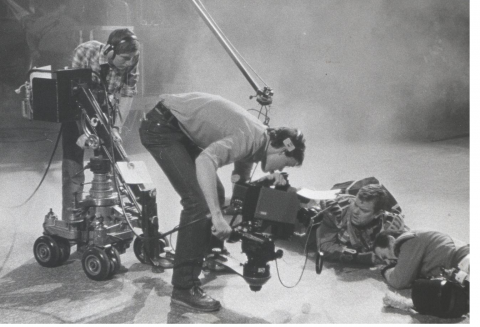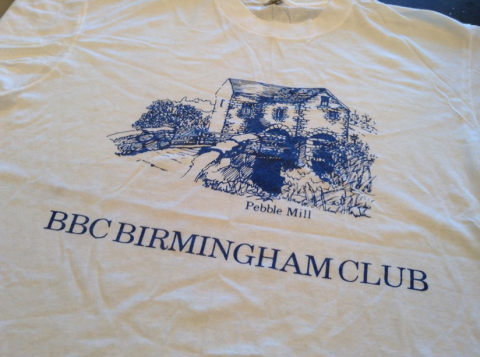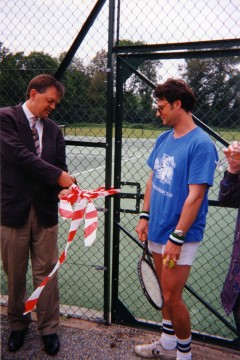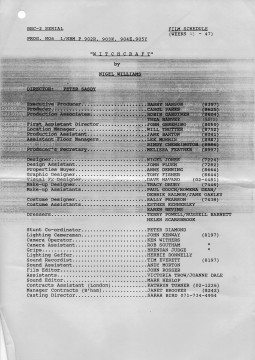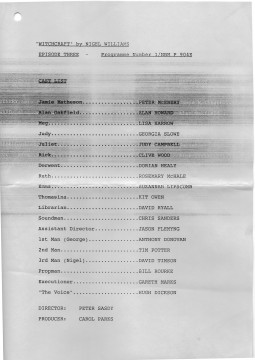
photo by Ben Peissel, 2003, no reproduction without permission
History of the BBC in Birmingham
(taken from notes held at the BBC Archives in Caversham)
1922 Nov 15 British Broadcasting Company begins transmitting from rooms at the GEC Works at Witton. Managed by Percy Edgar and Pat Casey, it consisted of three room: one contained the transmitter, one was the office and the other was the 12x20ft studio.
1923 Dec 6 The first ever Children’s Hour comes from Birmingham. Children’s circle established, proceeds of which were donated to West Midlands Children’s charities.
1924 Witton premises too small. Moved to top storey of 105 New Street. One studio and a suite of offices.
1926 New Street premises too small (and rat infested). Purpose built studios at 282 Broad Street acquired. Largest studio could accommodate a full orchestra and chorus.
1927 Jan 1 British Broadcasting Company dissolved and the British Broadcasting Corporation constituted under Royal Charter.
1927 Daventry ‘Experimental Transmitter’ replaces 5 IT at Witton.
1938 First episode of Paul Temple attracts 7,000 fan letters.
1949 Sutton Coldfield transmitter opens bringing television to the Midlands.
1951 Jan 1 The Archers first appears on the Light Programme. Brookfield Farm was located in Studio 2 at Broad Street for 20 years.
1951 BBC acquired the lease for Pebble Mill site.
1954 Carpenter Road, Edgbaston became the new Broadcasting House.
1955 Dec 29 First Midland Region television studio opened at Gosta Green, Birmingham.
1956 Gardening Club (now Gardeners’ World) began.
1957 Sept 30 First BBC Midlands TV News broadcast each weekday evening. 6.10-6.15.
1962 Nightly TV magazine programme – Midlands at Six
1962 A model of proposed BBC Pebble Mill Broadcasting Centre was show to the press.
1964 Sept First episode of Midlands Today presented by Barry Lankester and produced by Michael Hancock. News items were a football bribery trial, a new course on local government, Swedish sport and an item called ‘the body beautiful’.
1965 Immigrants Unit set up by Patrick Beech to provide Hindu/Urdu programmes. BBC’s first bi-media department, making programmes for both radio and television.
1967 First BBC Local Radio Station in Leicester.
1967 Pebble Mill – first sod was cut by then Director General Sir Hugh Greene.
1970 Nov 7 Pebble Mill began with Radio Birmingham, later became Radio WM.
1971 HRH Princess Anne officially opens the new Pebble Mill studios.
1972-86 Pebble Mill at One, presenters included Donny Macleod, Bob Langley, Ross King, Judi Spiers and Alan Titchmarsh.
1976 Saturday Night at the Mill – live. All staged in either one of the studios or outside the front of Pebble Mill. The courtyard around the back was constructed into a mini ice-rink with a canopy area for if it rained when live bands were on.
1977 The Horror of Fang Rock, only episode of Dr Who to be filmed here at The Mill. The set consisted of a lighthouse built in the studio, and it was the setting for a battle with an alien shape shifter. The story featured the one and only appearance in the series of a Rutan – seen in its natural state as an amorphous green blob with trailing tentacles. It was the fifteenth season of the series and the Doctor at the time was Tom Baker. It was transmitted between 03/09/1977 and 24/09/1977.
1988 Oct Midlands Today became the first regional news programme to include a nightly sports section.
